Introduction
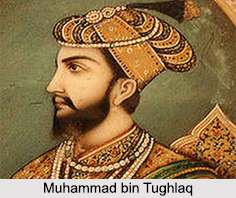 Also known by other names like Prince Fakhr Malik, Jauna Khan and Ulugh Khan, Muhammad bin Tughlaq was a prominent figure during the medieval Indian history. He was popular for his numerous policies and reforms that earned him the tag of "wise fool" among all the other Indian rulers. He succeeded his father Ghiyas- ud- din- Tughlaq in 1325, who was the founder of the Tughlaq dynasty.
Also known by other names like Prince Fakhr Malik, Jauna Khan and Ulugh Khan, Muhammad bin Tughlaq was a prominent figure during the medieval Indian history. He was popular for his numerous policies and reforms that earned him the tag of "wise fool" among all the other Indian rulers. He succeeded his father Ghiyas- ud- din- Tughlaq in 1325, who was the founder of the Tughlaq dynasty.
Muhammad bin Tughlaq ruled over the northern parts of the Indian subcontinent and the Deccan from 1325 to 1351 AD. A controversial ruler with a unique streak of intellectual creativity, Muhammad bin Tughlaq was one of the few Sultans of Delhi who received a comprehensive literary, religious and philosophical education.
Reign of Muhammad bin Tughlaq
During the reign of Muhammad bin Tughlaq, he annexed kingdoms around his Sultanate and conquered areas like Warangal or modern day Telangana, Malabar, Madurai and even to the southern tip of the Indian state of Karnataka. His rule was faced with several attacks from the Mongols and rebellions from a large, diverse population.
Some of the important administrative policies of Muhammad bin Tughlaq are discussed below elaborately:
Religious Policy of Muhammad bin Tughlaq
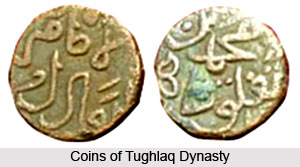 Muhammad Bin Tughlaq took his own decision regarding the matters of religious policy. The Sultan did not even permit the Ulema class to interfere in his administration. During his reign the Ulema class enjoyed monopoly over administration of justice. Muhammad Bin Tughlaq broke up that monopoly and appointed Qazis outside this class of people.
Muhammad Bin Tughlaq took his own decision regarding the matters of religious policy. The Sultan did not even permit the Ulema class to interfere in his administration. During his reign the Ulema class enjoyed monopoly over administration of justice. Muhammad Bin Tughlaq broke up that monopoly and appointed Qazis outside this class of people.
During early period of his reign, he neither sought recognition of Khalifa nor inscribed his name on his coins. The Sultan did nothing against Islam nor did he desire to flout the principles of Islam but he was not prepared to accept the interference of religion or that of any religious class in his administration. He used to change the decisions of Qazis whenever he found them unjust and discriminating. If a religious man was found guilty of corruption or rebellion, he was punished like any other ordinary person. Thus nobody was above the laws of the land. This is the reason why the Ulema class became antagonistic to Muhammad Tughlaq and spread discontentment against him.
Muhammad Tughlaq had to compromise with the Ulema during later years of his reign. He inscribed the name of Khalifa on his coins, sought recognition of his office from him in 1340 A.D. and invited Ghiyas-ud-din Muhammad, one distant relative of the Khalifa of Egypt, to his court. Muhammad Tughlaq was tolerant towards his Hindu subjects. He was the first Sultan of Delhi who distributed respectable offices to the Indian Muslims and the Hindus. In this field, he was ahead of his time.
With his entire liberal attitude, Muhammad Bin Tughlaq failed to get admiration and sympathy of his subjects. But the reason was not his attitude but the failure of his schemes and oppressive measures of his policies.
Revenue Reforms of Muhammad bin Tughlaq
Muhammad bin Tughlaq carried out many measures for the improvement of the administration of revenue. One of his measures was preparation of a register in which income and expenditure of all the princes were recorded. All provincial governors were asked to submit the reports of income and expenditure of their concerning provinces to the centre for this purpose. Nothing advantageous came out of the scheme.
Taxation in Doab
Taxation in the Doab was increased during the initial years of the reign of the Sultan. The taxes were increased at the time when there was a famine in the Doab owing to the failures of the rain. The peasants instead of paying taxes abandoned their lands and adopted highway robbery. The tax collectors continued to collect taxes by oppression which resulted in widespread revolts. Thus this scheme of the Sultan failed severely.
Agricultural Policy of Muhammad bin Tughlaq
Muhammad bin Tughlaq had set up a separate department of agriculture and appointed a minister to look after it. The main object of the department was to increase the land under cultivation. Though the government spent an exorbitant sum of money but this experiment failed and the scheme was abandoned after 3 years. The corruption of the officer, inferior quality of land chosen for farming and lack of interest of cultivators who were assigned land under government administration were accountable for the failure of the scheme.
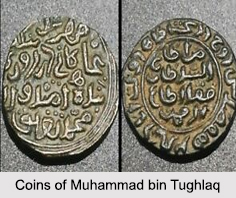 Transfer of Capital by Muhammad bin Tughlaq
Transfer of Capital by Muhammad bin Tughlaq
Muhammad bin Tughlaq attempted to transfer the capital from Delhi to Devagiri which was renamed Daultabad. His motive to shift was to prevent his capital from recurring Mongol raids, to gain control over the rich fertile lands of the Deccan and ensure access to the busy ports on the Gujarat and the Coromandel Coast.
Muhammad bin Tughlaq"s decision was not fundamentally wrong if the shift was just limited to his official court. But he wanted the entire population of Delhi to shift and thus the journey from Delhi to Daultabad was a harrowing experience for the people as many died on the way. This scheme of the Sultan failed massively.
Introduction of Token Currency by Muhammad bin Tughlaq
During his reign, Muhammad bin Tughlaq introduced the system of token currency and fixed up their relative values. The remarkable feature of the coinage system was the introduction of copper and brass coins. The Sultan made these token coins legal tenders and kept their value at par with gold and silver coins. He launched the coins without taking any precaution against forgery. The market was flooded with fake coins and there was economic chaos. In this situation, the Sultan withdrew all the copper coins, which caused a huge loss to the royal treasury. This scheme of the Sultan also failed miserably.
Conquests of Muhammad bin Tughlaq
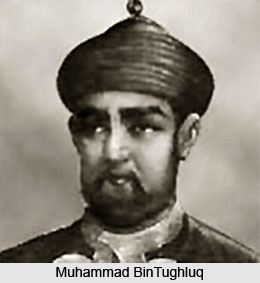 Conquest of Muhammad Bin Tughlaq was widespread. He extended his territories to the extent which no other Sultan of Delhi had even attempted. During early years of his reign, Muhammad Tughlaq planned to conquer Khurasan and Iraq. The unstable political condition of Central Asia inspired the Sultan to undertake this project. The Sultan raised a huge army of three lakh and seventy thousand soldiers for this purpose. But very soon the condition of Central Asia changed and the Sultan realised the futility of his scheme. Therefore, he abandoned the scheme and the army was dispersed.
Conquest of Muhammad Bin Tughlaq was widespread. He extended his territories to the extent which no other Sultan of Delhi had even attempted. During early years of his reign, Muhammad Tughlaq planned to conquer Khurasan and Iraq. The unstable political condition of Central Asia inspired the Sultan to undertake this project. The Sultan raised a huge army of three lakh and seventy thousand soldiers for this purpose. But very soon the condition of Central Asia changed and the Sultan realised the futility of his scheme. Therefore, he abandoned the scheme and the army was dispersed.
The fort of Nagarkot was in Kangra district in Punjab. No Muslim ruler had conquered it by then and it was in the hands of a Hindu king. Muhammad Tughlaq conquered it though he restored it back to its ruler after his acceptance of suzerainty of Delhi. In south India, Ghiyas-ud-din Tughlaq had annexed Telingana and a large part of Malabar Coast. Muhammad Tughlaq made fresh annexations in the south. Muhammad Tughlaq captured Kondhana or Singharh from Nag Nayak. Muhammad Tughlaq, thus, conquered greater part of south India and annexed it to the Delhi Sultanate.
Muhammad failed to get any success in Rajasthan, but largely succeeded in carrying out his series of conquests. Of course, he failed at few places, yet his Empire was more extensive than any other Sultan of Delhi. The authority of the Sultan was acknowledged over India, save Kashmir, Orissa, Rajasthan and a strip of Malabar Coast, and he established an effective system of administration over this vast empire.
Revolts during Muhammad bin Tughlaq"s Empire
Though Muhammad Tughlaq succeeded in extending his empire he failed to keep it intact for long. A large part of it was lost by him during the later years of his reign. There were several reasons which led to the downfall of the Tughlaq Empire. One of the major reasons is the occurrence of several revolts in Muhammad bin Tughlaq"s reign. A few of them were attempted by his ambitious nobles. But, most of them were either the outcome of his tyrannical policy or because of his failure to keep state affairs under his power. A few of the revolts succeeded and, thus, led to the disintegration of his empire. In 1327-28 A.D, Bahram Aiba alias Kishlu Khan, governor of Uch, Sindh and Multan, revolted against the Sultan. There was a revolt in Bengal in 1327-1328 A.D and several other revolts occurred in Sunam, Samana, Kara, Bidar, Gulbarga and Multan as well.
Downfall of Muhammad bin Tughlaq
As a ruler, Muhammad Tughlaq was devoted and extremely laborious. But during his 26 years of rule, he gained no success in any field of administration. All his policies of internal reform failed and each of them taxed the resources of the empire, brought misery to his subjects and ruined his reputation among them. The failure of the Sultan as an able administrator is not only because of his own weaknesses but also because of certain circumstances and non-cooperation of his subjects who were backward and prejudiced against him.
Muhammad died when campaigning in Sindh. He was succeeded by his cousin Firoz Shah Tughlaq.
Domestic Policies of Muhammad bin Tughlaq
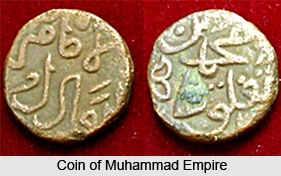 Muhammad Bin Tughlaq was an ambitious ruler and adopted several innovations in domestic affairs. Different measures were taken in the field of administration such as revenue reforms, taxation in Doab, improvement of agriculture, transfer of the capital and the introduction of token currency. Though these policies were attempted with best intentions but it adversely affected the fortune of the empire.
Muhammad Bin Tughlaq was an ambitious ruler and adopted several innovations in domestic affairs. Different measures were taken in the field of administration such as revenue reforms, taxation in Doab, improvement of agriculture, transfer of the capital and the introduction of token currency. Though these policies were attempted with best intentions but it adversely affected the fortune of the empire.
Muhammad Tughlaq carried out many measures for the improvement of the administration of revenue. One of these measures was preparation of a register in which income and expenditure of all the princes were recorded. The main motive of the Sultan was to introduce a uniform standard of land revenue all through his empire and to see that no village remained unassessed. However, nothing is known about the advantages of this system. In the beginning of his reign, the Sultan increased taxation in the Doab. According to Barani, the taxation was raised by ten to twenty times more. Taxes were increased and at a time when there had been a famine in the Doab owing to the failure of rains. Therefore, the peasants, instead of paying the taxes, abandoned their lands and adopted highway robbery. The tax collectors continued to collect taxes by tyranny which resulted in widespread revolts. This policy of the Sultan proved to be a perfect failure. Even the usual revenue could not be collected from the Doab. Besides, the Sultan became unpopular among his subjects.
Muhammad Bin Tughlaq established a separate department of agriculture and appointed a minister Amir-i-kohi, to look after it. The main purpose of this department was to increase the land under cultivation. Nearly, seventy lakh rupees, was spent by the government in three years yet the experiment failed and the scheme was abandoned after three years. The corruption of the officer, poor quality of land chosen for farming and indifference of cultivators who were assigned land under government supervision were responsible for the failure of the scheme.
Muhammad Tughlaq`s attempt to transfer the capital from Delhi to Daultabad was another futile measures adopted by him. Several reasons can be citied for him to take this step. The empire of the Sultan had extended far and wide within the territories of India and Daultabad was in fee centre and more strategically placed as compared to Delhi. The administration and consolidation of south India required more attention as compared to the north, the desire to keep the capital a safe distance from invasions of the Mongols or, on the contrary, be absence of danger from invasions of the Mongols, the temptation of wealth of the south, and, probably, the desire of the Sultan to spread Muslim culture in the south were different reasons of the Sultan to transfer the capital to Daultabad. The common masses were neither prepared to shift themselves to a distant place nor was there any necessity of it. This scheme of the Sultan failed completely.
Various types of coins were introduced by Muhammad Bin Tughlaq during his reign. The note worthy feature of the coinage system was the introduction of token currency and issue of copper and brass coins. The Sultan made these token coins legal tenders and kept their value at par with gold and silver coins. Previously, the copper coin was Jital (Paisa). Now, the Sultan issued Tanka (rupee), a silver coin, also that of copper. This scheme of the Sultan also failed miserably. Many historians blamed the Sultan for the failure of the scheme. According to them it was a blunder on the part of the Sultan that he did not take proper precaution to check imitation of coins issued by royal mints. Those coins, therefore, could be imitated by moderately skilled artisans. Therefore, the citizens began to mint token coins in their houses. In fact, both the Sultan and his subjects were responsible for the failure of this scheme.
Thus Muhammad Bin Tughlaq failed to carry any of the schemes to success. It can be said in favour of the sultan that his measures were ahead of his time; his subjects and officials failed to understand worth of his schemes and, therefore, did not cooperate with him to bring them to success. The Sultan himself was also responsible for the failure of his schemes to a large extent. The Sultan possessed an artistic mind but lacked practical wisdom. He, therefore, could formulate new schemes which, probably, were sound in principles but he failed to devise practical measures to bring them to success. The Sultan lacked patience also. He desired quick success; even minor failure enraged him and when desired results could not be achieved speedily, he abandoned his scheme in haste. All these weaknesses participated in failure of his domestic policies.



















